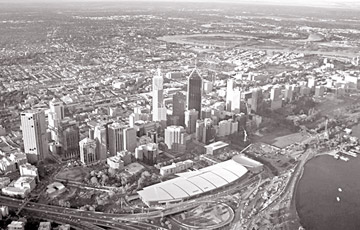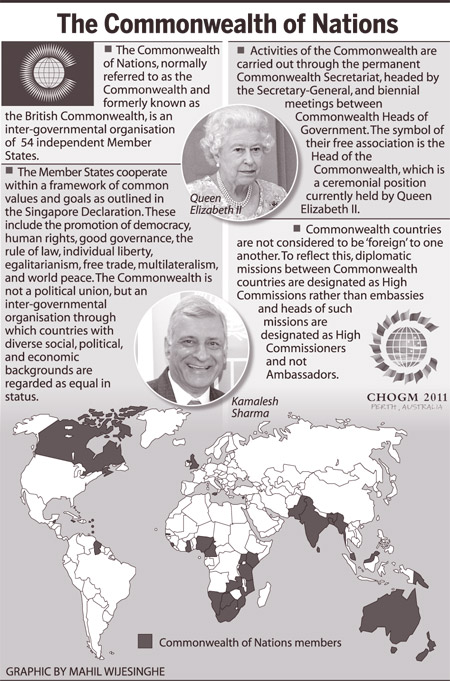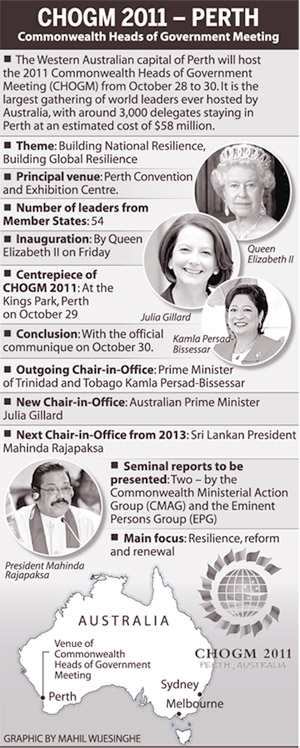|
CHOGM 2011 in Perth from October 28-30 :
Unique platform to promote democracy, development
By Dinesh WEERAWANSA Prior to CHOGM Coverage in
Perth
|

An aerial view of the Perth Convention and Exhibition Centre
|
The next Commonwealth Heads of Government Meeting (CHOGM) will be
held in Perth, Western Australia, from October 28 - 30, 2011. The
principal venue for the meeting will be the Perth Convention and
Exhibition Centre.
Leaders of member countries will focus attention on a wide array of
issues of collective interest to the 54-member Commonwealth. Queen
Elizabeth II will open the Commonwealth Summit on Friday (28) as the
head of the Commonwealth. A retreat on October 29 in Perth’s Kings Park
will be the centrepiece of this year’s CHOGM, which concludes with an
official communique on October 30.
The Commonwealth of Nations, generally referred to as the
Commonwealth and formerly known as the British Commonwealth, is an
inter-governmental organisation of 54 member States.
The CHOGM attracts one of the biggest gatherings of Heads of State as
it brings together leaders representing around one quarter of the world
and one-third of its population. The CHOGM held once in two years is the
highest consultative and policy-making mechanism of the Commonwealth.
This is the third occasion that Australia will host the CHOGM as the
previous Commonwealth Summits were held in Melbourne (1981) and Coolum
(2002).
The 2011 CHOGM will be one of the largest gatherings of world leaders
hosted by Australia, with around 3,000 delegates in Perth at an
estimated cost of $58 million. The CHOGM leaders represent two billion
people across six continents from Africa, Asia, the Americas, the
Caribbean, Europe and South Pacific.
 Australia’s
Prime Minister Julia Gillard, will host the Heads of Government Meeting
and take over as the Commonwealth Chairperson-in-Office and will
continue in office till the 2013 CHOGM which will be held in Sri Lanka.
The main decision-making forum of the Commonwealth is the biennial CHOGM,
where Commonwealth Heads of Government, including Prime Ministers and
Presidents meet for a few days to discuss matters of mutual interest. Australia’s
Prime Minister Julia Gillard, will host the Heads of Government Meeting
and take over as the Commonwealth Chairperson-in-Office and will
continue in office till the 2013 CHOGM which will be held in Sri Lanka.
The main decision-making forum of the Commonwealth is the biennial CHOGM,
where Commonwealth Heads of Government, including Prime Ministers and
Presidents meet for a few days to discuss matters of mutual interest.
CHOGM is the successor to the Meetings of Commonwealth Prime
Ministers. The earlier Imperial Conferences and Colonial Conferences
were held in 1887. Apart from the main decision-making summit, there
will be regular ministerial level meetings on finance, law and health.
The Commonwealth’s 2011 theme - ‘Women as Agents of Change’ will be
of particular significance in Perth as the Commonwealth’s first woman
Chair-in-Office, Kamla Persad-Bissessar, the Prime Minister of Trinidad
and Tobago, will hand over the chair to another woman, Julia Gillard.
Important role
President Mahinda Rajapaksa, who is due to leave for Australia
tomorrow for the forthcoming Commonwealth Summit, will take over from
the Australian Prime Minister as the Commonwealth Chair-in-Office for
2013-2015. With Sri Lanka due to host the 2013 CHOGM, its high-powered
delegation to Perth will have an important role to play at the
forthcoming Summit.
The CHOGM 2011 in Perth will promote democracy and development
agendas for the Association as the Commonwealth Heads of Government will
gather for their biennial meeting with proposals for reform which could
significantly re-shape the future of the 62-year-old Association.
Leaders of the 54 participating nations will meet in the Western
Australian city under the theme, Building National Resilience, Building
Global Resilience, which will examine issues faced by all member States
of the Commonwealth, especially the most economically vulnerable States.
The leaders of the Commonwealth nations are expected to consider
matters relating to good governance, human rights, climate change,
wealth creation, food security and natural resource management in the
face of the deepening global financial concerns and the debate on aid
effectiveness. The Commonwealth’s 32 small States – characterised by a
population of less than 1.5 million – are exposed to economic shocks and
the impact of climate change. Attention will also be focused on how best
resilience could be fostered and extend support to these countries on
mitigation and adaptation.
CHOGM comes at an important time for the G20 meeting of world leaders
scheduled to be held next month. Five Commonwealth States- Australia,
Canada, India, South Africa and the United Kingdom are members of the
G20.
The 2011 Perth CHOGM takes place on the eve of the Durban Conference
of the Parties to the UN’s Framework Convention on Climate Change, also
known as COP 17.
Hence, CHOGM provides an ideal platform for deliberation by the full
diversity of the Commonwealth membership on the agendas, and the
opportunity to contribute collectively debated and agreed
pan-Commonwealth views to these key international gatherings, by
Commonwealth Foreign Ministers on the eve of CHOGM and by the Heads of
Governments.
 Two
seminal reports, mandated by the leaders when they last met in the Port
of Spain, Trinidad and Tobago, in November 2009, will be presented at
this week’s Perth Summit. The Commonwealth Ministerial Action Group (CMAG)
– a representative group of nine foreign ministers is charged with
protecting the Commonwealth’s fundamental political values against
serious or persistent violations. The CMAG report is the product of
inter-governmental discussions and recommends ways in which its work can
be made more proactive and positive. Meanwhile, an Eminent Persons Group
(EPG) comprising 10 distinguished independent Commonwealth personalities
has submitted a report offering 106 recommendations to sharpen the
impact, strengthen the networks and raise the profile of the
Commonwealth. Two
seminal reports, mandated by the leaders when they last met in the Port
of Spain, Trinidad and Tobago, in November 2009, will be presented at
this week’s Perth Summit. The Commonwealth Ministerial Action Group (CMAG)
– a representative group of nine foreign ministers is charged with
protecting the Commonwealth’s fundamental political values against
serious or persistent violations. The CMAG report is the product of
inter-governmental discussions and recommends ways in which its work can
be made more proactive and positive. Meanwhile, an Eminent Persons Group
(EPG) comprising 10 distinguished independent Commonwealth personalities
has submitted a report offering 106 recommendations to sharpen the
impact, strengthen the networks and raise the profile of the
Commonwealth.
Heads of Government in Perth will be called upon to consider
proposals in both reports for reform and renewal of the Commonwealth as
an Association in the 21st century. Strategic partnerships and
communications will play an important role. Commonwealth
Secretary-General Kamalesh Sharma said that CHOGM 2011 would focus on
resilience, reform and renewal.
He said the Commonwealth is keen to engage young people in the
broader Commonwealth exchange, considering the fact that over half of
the Commonwealth’s citizens is under 25. Hence the focus on young people
will continue at the 2011 CHOGM, with a four-day Commonwealth Youth
Forum (CYF) in nearby Fremantle, culminating in a unique dialogue
between selected youth delegates and leaders. The CYF, the Commonwealth
People’s Forum – which represents Commonwealth civil society and the
Commonwealth Business Forum, will be had from tomorrow.
Strong commitment
The member countries of the Commonwealth share a strong commitment to
the fundamental principles of democracy and development, good
governance, rule of law, and protection of human rights. CHOGM provides
a unique platform for Commonwealth leaders to work together to address
significant global challenges.
It provides an opportunity for Commonwealth leaders to discuss
national and global challenges, to exchange views and best practices to
explore the road to peace and prosperity for one and all and deliberate
on how this leading organisation can serve the world better.
Members of the Commonwealth cooperate within a framework of common
values and goals, as outlined in their Singapore Declaration. These
include the promotion of democracy, human rights, good governance, rule
of law, individual liberty, egalitarianism, free trade, multilateralism
and world peace.Activities of the Commonwealth are carried out by the
permanent Commonwealth Secretariat, headed by the Secretary-General. The
symbol of their free association is the Head of the Commonwealth, which
is a ceremonial position currently held by Queen Elizabeth II. What is
unique in the Commonwealth is that its member countries are not
considered to be ‘foreign’ to one another.
By this diplomatic missions between Commonwealth countries are
designated as High Commissions rather than Embassies and heads of such
missions are designated as High Commissioners and not Ambassadors. With
the Perth CHOGM round the corner, it would be interesting to look into
its history and birth of the Commonwealth. While visiting Australia in
1884, Lord Rosebery described the changing British Empire - as some of
its colonies became more independent - as the ‘Commonwealth of Nations’.
Conferences of British and colonial Prime Ministers had been held
periodically since the first in 1887, leading to the creation of the
Imperial Conferences in 1911. Since then, the Commonwealth developed
from the Imperial Conferences and a specific proposal was presented by
Jan Christian Smuts in 1917 when he coined the term ‘the British
Commonwealth of Nations’, and envisioned the ‘future constitutional
relations and readjustments in the British Empire’.
After the World War ended, the British Empire was gradually
dismantled - only 14 British overseas territories are held by the United
Kingdom todate. Following the London Declaration in April 1949, the word
‘British’ was dropped from the title of the Commonwealth to reflect its
changing nature. The Commonwealth has come a long way since the Imperial
Conference a century ago. After 100 years of the first Imperial
Conference, the Commonwealth is faced with greater challenges - climate
change, wealth creation, food security and natural resource management
in the face of deepening global financial concerns and the debate on aid
effectiveness. |

